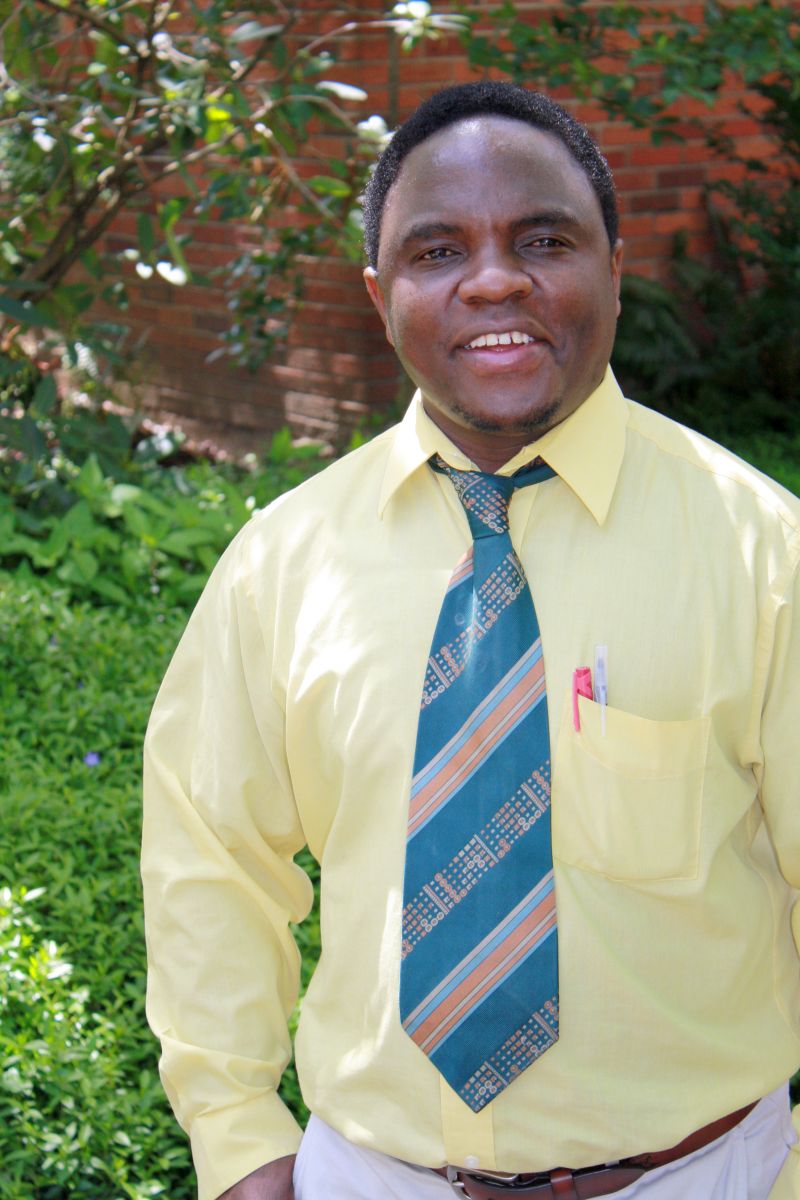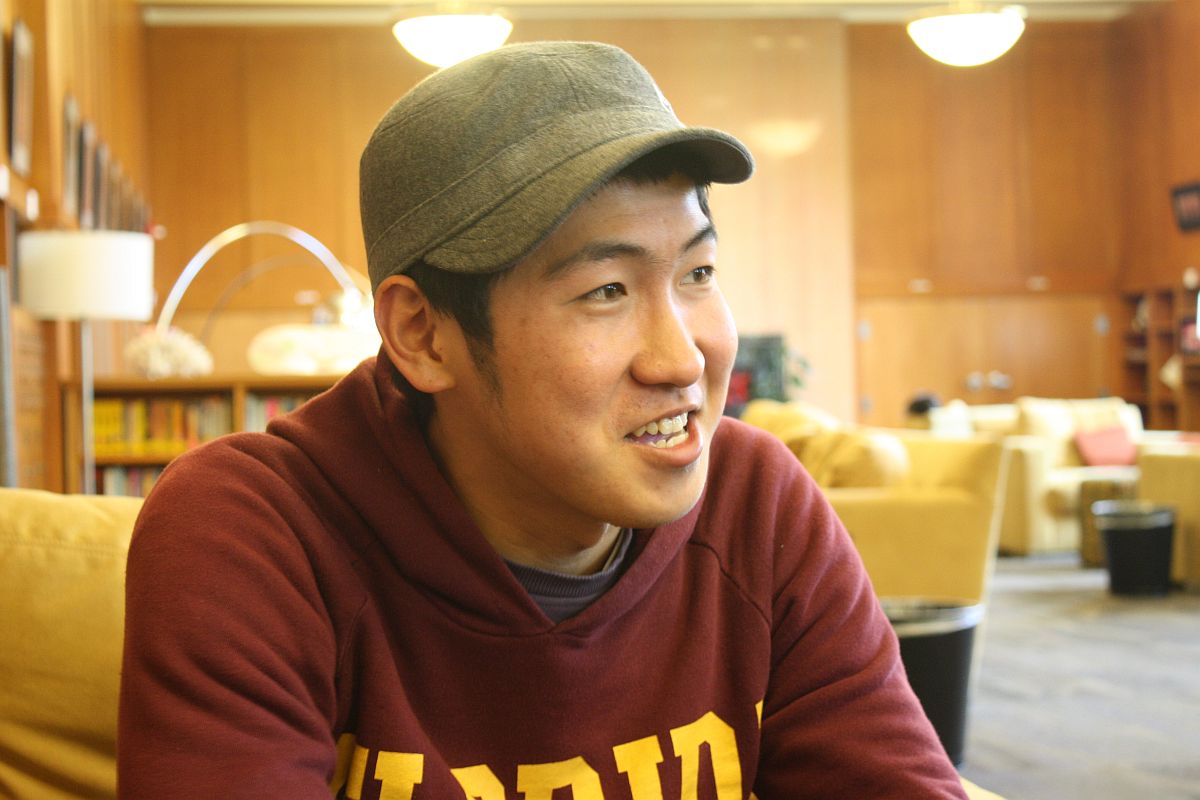Story by Stephen Zegalia
Photos as noted
The plates at the dinner table in Suzie Heilman’s house on Fillmore Street are loaded with pulled pork and baked potatoes. Conversation abounds about sports and travel plans, and everyone at the table has a lot to say. It might be easy to imagine this as a traditional family dinner if everyone at the table weren’t from a different country.
Ahmed Alkahawajah, Minsik Park, and Lan Nhan are all studying at the University of Oregon through the American English Institute (AEI), which helps international students learn the English language in an immersive atmosphere. Alkahawajah hails from Saudi Arabia, Nhan from Vietnam, and Park from South Korea. They are the latest group to live in Heilman’s house, where she has hosted students for fourteen years.
Although they are all studying English through the AEI program, the students are in different stages of their education. Nhan is a freshman business major who plans to transfer to Texas Christian University after this semester, Alkahawajah has an undergraduate degree in engineering from a college in Saudi Arabia, and Park is a junior logistics major at his university in South Korea.
Park, who has been at the UO since winter term, came to the United States to learn English in order to get a better job in Korea. Because the University has no logistics major, he is taking business classes in addition to AEI classes to further his studies. He says that life in Eugene was an adjustment from his Korean home in the Jeju Islands, but he’s gotten used to it. “When I first got here, I thought Eugene was like the countryside. But people in Eugene are very kind. Some of my friends went to New York and L.A. and I hear the people aren’t as nice,” he says.
Park’s also glad that he chose to live with a host mother: “Before I came here, I had two options: home stay or dormitories. The dorms were more expensive then home stay, but this is very good for me, because I can practice English all the time with my host mom and roommates.”
Nhan, the youngest of the roommate at eighteen, agrees with Park. “Honestly, I think the home stay program is a very good idea. It seriously helped me adapt to a new culture,” he says. “Not only when you come to America but any new culture, it’s very easy to have culture shock. The home stay program helped me get that out of the way. You kind of have a base, where if you have any questions you have someone to ask.”
As a result of these interactions, Nhan says his English has improved a great deal. Although Nhan was excited to study in the U.S., he says it was a big transition: “I think it’s a big gap, it’s very different. There are a lot of things I’ve never seen before. The culture, how people interact and language, it’s all different.”
Nhan has integrated himself with the UO community by getting involved with the Vietnamese Student Association (VSA). He recently helped to organize Vietnam Night, an experience that he says helps him feel closer to his home country. “It was fabulous,” he says. “I’m an international student, so it’s a good thing to have that community, like a little home. [Vietnamese Night] was one of my favorite times in Eugene.”
Because the three roommates at Heilman’s house are learning English together, they say it’s easier to help one another at their own pace. The only complaint that Park has about the experience is the distance from campus. “You know, it takes about twenty or thirty minutes by bus. I got a bike from the Outdoor Program and it takes a shorter time now.”
Although Park and the roommates at Heilman’s have relatively few problems with their experience, international students who choose to live on their own can be in for unexpected issues.
One such student, Ting-Han, is a senior international business major from National Taiwan University. She chose to live off campus this year, having already spent a summer at the University of California, Berkeley in 2008.
According to Chang, things went differently than expected: “I thought I would be fine and I chose to live off campus, so I didn’t apply to live in the dorms, but actually the first term was kind of hard. I moved four times.”
Before moving into her first apartment, which is in the apartment complex Duck’s Village, Chang spent a week-long stay with a host family before school started, to help her get acquainted with Eugene and American life. “I was excited because I had never lived with a host family before. It was a very enjoyable stay. But after I left…”
Chang trails off to signify her disappointment with the several living situations that she dealt with after moving into her apartment in Duck’s Village, a place that she says was not conducive to studying. She also spent time with her host family’s elderly parents in Springfield, as well as in another apartment, before finding her current roommate on Craigslist.
Although Chang has happily lived with her roommate for five months now, she says, “I would say that the initial living situation was a culture shock.”
Students and their host families are together for a relatively short time, but the bonds that they share can last for much longer. Marko Mwipopo, a Swahili instructor at the UO, came to the United States in 2005 after finishing his undergraduate degree in his home country of Tanzania. His trip was a cultural fellowship organized by the State Departments of Tanzania and the U.S., but he didn’t know much about life in the United States at the time.
He says his host mother Beryl Brinkman helped to make him feel more comfortable and to adapt to American life. “She picked me up at the airport with a group of people and a sign that said ‘Welcome Marko’ in my native language,” he says. “That really comforted me.” A single woman in her sixties and the retired president of the West Cascades Peace Corps Association (WCPCA), Brinkman was a world traveler who, according to Mwipopo, had been to most of the countries in the world.
“At first I didn’t believe her when she told me she had been to all of these countries,” he says, “But she showed me a list of all the places she had been, all of her photos and travel documents.” On one of her excursions in the 1980s, Brinkman had visited Tanzania, and as it turned out she had met some people in Dar es Salaam that Mwipopo also knew, giving them something more in common.
Although he was an adult with a college degree and could look out for himself to some extent in a new environment, Mwipopo credits Brinkman with educating him on the customs and social mores of the U.S. “If I had a question about what I was supposed to do in a situation, she would tell me how it is done here,” he says. “Beryl had a lot of life experience, and she really helped me to adapt.”
Sadly, Brinkman died of a sudden heart attack in February 2007. According to Mwipopo, her death came as a huge shock, because she seemed to be in good health for a woman her age. At the time, they had been planning a trip to Tanzania together so that Brinkman could reconnect with some of the people she had met there in the eighties. “She wanted to go back and see how things had changed since she was there,” he says. “She was a great woman.”
Mwipopo then moved in with another host mother, Mary Artis Spriggs, whom he lived with from the beginning of 2007 to August 2009. Spriggs was Brinkman’s friend from their time with the Peace Corps in Afghanistan in the 1960s, and had recently moved to Eugene at the time of her death. Mwipopo says that she introduced him to her many connections: “There are so many people that I’ve met. I feel like there are more people in Eugene who know me than I can keep track of.”
Tragically, Spriggs also died suddenly, after brain surgery in 2010. Mwipopo remains close to Brinkman’s and Spriggs’ families. “We talk a lot,” he says. “I just received a letter from Spriggs’ sister in Ohio, and I recently spoke to her brother-in-law who lives down in Yreka about meeting when he comes up here again.”
Although he had a relatively short time with both of the women, Mwipopo is grateful to have learned from them: “In my culture, there is a lot of respect for older people, because there isn’t as much access to information, and they have more experience and wisdom,” he says. “I think because of that, I was really grateful to Beryl and Artis for taking me in and sharing with me.”
Heilman believes that those who host students get as much out of the experience as the students, because of the exchange of knowledge about different cultures. “It’s a way to bring people together, to learn something you didn’t know about the world and other people,” she says. “I’ve never been to some of these countries, but I could tell you all about daily life in a lot of different places because we talk about it so much. In a lot of ways, it helps us realize that we’re all the same.”
Categories:
Finding a Home Away from Home
May 25, 2011
Finding a Home Away from Home
0









